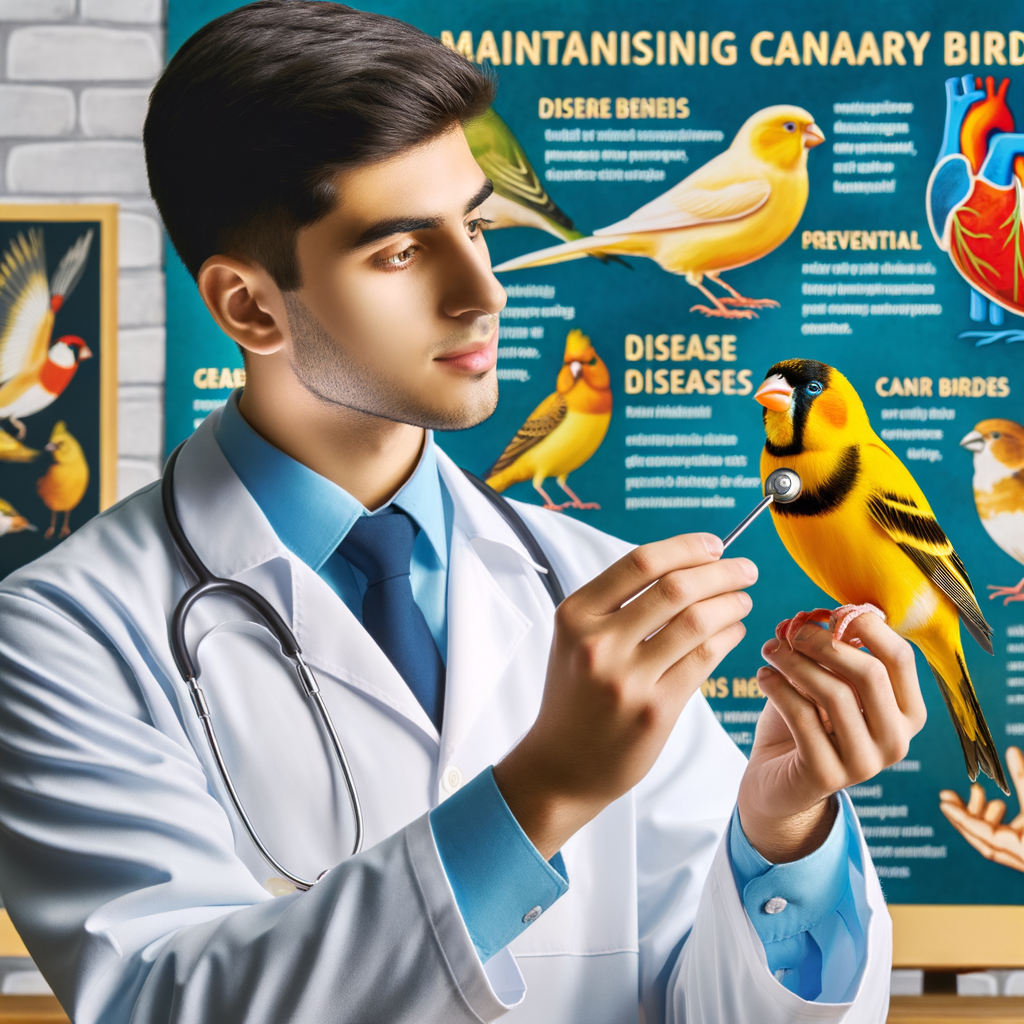
Introduction to Canary Bird Health
Canary birds are known for their vibrant colors and melodious songs. However, like any other pet, they also require proper care and attention to maintain their health. In this section, we will discuss the importance of preventive health in canary birds and some common health issues they may face.
- Importance of Preventive Health in Canary Birds
- Common Health Issues in Canary Birds
Preventive health is crucial for canary birds. It involves taking steps to ensure your bird remains healthy and avoids potential health issues. Regular check-ups with a vet, a balanced diet, and a clean environment are all part of preventive health care.
Did you know that a healthy canary bird can live up to 10-15 years? That’s a long time for a pet bird! But to reach this age, they need to stay healthy. And that’s where preventive health comes in. It helps to catch any health issues early before they become serious problems. This not only increases the lifespan of your bird but also improves their quality of life.
Despite our best efforts, canary birds can sometimes fall ill. Some common health issues in canary birds include feather plucking, respiratory problems, and obesity. Let’s take a closer look at each of these:
| Health Issue | Description |
|---|---|
| Feather Plucking | This is when a bird pulls out its own feathers. It can be due to stress, boredom, or a medical condition. |
| Respiratory Problems | Canary birds have delicate respiratory systems. Exposure to dust, smoke, or poor air quality can lead to respiratory issues. |
| Obesity | Just like humans, birds can also become overweight. This is usually due to a poor diet or lack of exercise. |
Understanding these common health issues can help you spot any signs of illness in your bird early. Remember, the sooner you catch a problem, the easier it is to treat!
Understanding Sickness Prevention in Birds
Keeping our feathered friends healthy is a priority for every bird owner. Understanding common diseases and how to prevent them is the first step towards ensuring their wellbeing. In this section, we will focus on Canary birds, a popular choice among bird enthusiasts.
Common Diseases in Canary Birds
Canary birds, like all pets, can fall prey to various diseases. Let’s take a look at three common diseases that can affect these beautiful creatures.
- Avian Influenza
- Canary Pox
- Trichomoniasis
Also known as bird flu, Avian Influenza is a viral infection that can affect many bird species, including Canaries. Symptoms can range from mild to severe and include respiratory distress, loss of appetite, and sudden death. It’s important to note that some birds may carry the virus without showing any signs of illness.
Canary Pox is a viral disease that causes lesions on the skin and in the mouth. It can be transmitted through direct contact with infected birds or through mosquito bites. Symptoms include weight loss, difficulty breathing, and lethargy.
Trichomoniasis is a parasitic disease that primarily affects the bird’s upper digestive tract. It can cause symptoms such as difficulty swallowing, regurgitation of food, and a noticeable change in the bird’s voice. This disease is often spread through contaminated food or water.
Knowledge is power. By understanding these diseases, you can take steps to prevent them and keep your Canary healthy and happy. In the next section, we will discuss some effective strategies for preventing bird diseases.
Preventing Bird Diseases
Preventing bird diseases is a crucial part of keeping your canary bird healthy and happy. Here are some key strategies you can use:
- Regular Vet Check-ups
- Proper Cage Hygiene
- Isolation of Sick Birds
Regular vet check-ups are a must for all bird owners. These check-ups can help identify any potential health issues before they become serious. A vet can examine your bird for signs of illness, administer necessary vaccinations, and provide advice on diet and care. According to a study, regular vet visits can increase the lifespan of your bird by up to 25%.
Keeping your bird’s cage clean is another essential step in preventing diseases. A dirty cage can become a breeding ground for bacteria and parasites, which can lead to various health issues. Make sure to clean the cage regularly, remove any uneaten food, and change the water daily. A clean cage not only prevents diseases but also creates a comfortable environment for your bird.
If one of your birds becomes sick, it’s important to isolate them from the rest of the flock. This helps prevent the spread of disease to other birds. While in isolation, provide the sick bird with proper care and treatment. Once the bird has fully recovered, it can be reintroduced to the rest of the flock.
Remember, prevention is always better than cure. By following these strategies, you can ensure your bird stays healthy and lives a long, happy life.
Keeping Canary Birds Healthy
Keeping your canary bird healthy is a top priority. To do this, you need to understand the basics of canary bird care. Let’s delve into the key aspects of canary bird care.
Canary Bird Care
Proper care for your canary bird involves three main aspects: the right cage size and placement, regular exercise, and interaction and socialization.
- Proper Cage Size and Placement
- Regular Exercise
- Interaction and Socialization
Canaries need space to fly and move around. A cage of at least 24 inches in length is recommended. Place the cage in a quiet, well-lit area, away from drafts and direct sunlight. This will help your bird feel safe and comfortable.
Canaries are active birds and need daily exercise to stay healthy. Allow your bird out of its cage for supervised flight time in a secure room. This will help keep its muscles strong and its mind stimulated.
While canaries are not typically ‘hands-on’ pets, they still benefit from interaction and socialization. Talk to your bird regularly, play soft music, or even watch TV together. This will help your canary feel part of the family and reduce stress.
By following these guidelines, you can ensure that your canary bird stays healthy and happy. Remember, a healthy bird is a happy bird!
Vibrant Canary Birds: Signs of Good Health
When it comes to keeping canary birds healthy, it’s important to know the signs of good health. These signs are easy to spot and can help you ensure your bird is in the best possible condition. Let’s take a look at three key indicators of a healthy canary bird.
- Active and Alert Behavior
- Consistent Eating Habits
- Regular Preening
One of the first signs of a healthy canary bird is active and alert behavior. Canary birds are naturally lively creatures. They should be responsive to their surroundings, showing interest in their environment. If your bird is hopping around, singing, and showing curiosity, it’s a good sign they’re feeling well.
Another sign of good health in canary birds is consistent eating habits. Healthy birds will eat regularly and maintain a steady diet. If you notice your bird is eating the same amount of food each day, it’s a positive sign. However, if there are sudden changes in their eating habits, it may be a sign of illness.
Last but not least, regular preening is a sign of good health in canary birds. Preening is when birds clean their feathers with their beak. It’s a normal behavior that keeps their feathers in good condition. If your bird is preening regularly, it shows they’re taking care of themselves and are likely in good health.
In conclusion, active and alert behavior, consistent eating habits, and regular preening are all signs of good health in canary birds. By keeping an eye on these behaviors, you can help ensure your bird stays healthy and happy.
Bird Health Strategies
Keeping our feathered friends healthy is a top priority. This section will focus on the diet strategies for canary birds, which is a crucial part of their health.
Canary Bird Diet
A balanced diet is essential for the health and longevity of canary birds. Let’s explore the importance of a balanced diet, the recommended foods, and the necessary supplements and vitamins for canary birds.
-
Importance of a Balanced Diet
A balanced diet for canary birds is not just about filling their feeders. It’s about providing the right nutrients for their growth, health, and happiness. A balanced diet can help prevent diseases, boost their immune system, and ensure they live a long, healthy life.
-
Recommended Foods for Canary Birds
Canary birds thrive on a diet of seeds, fruits, vegetables, and grains. Seeds should make up about 50% of their diet. Fruits and vegetables like apples, carrots, and spinach can be included for variety and additional nutrients. Grains like cooked quinoa or brown rice can also be added occasionally.
-
Supplements and Vitamins
While a varied diet can provide most of the necessary nutrients, supplements and vitamins can help fill any nutritional gaps. Vitamin A for good vision, Vitamin D for strong bones, and Vitamin E for a healthy heart are essential. Always consult with a vet before starting any supplement regimen.
In conclusion, a balanced diet, including a variety of foods and necessary supplements, is key to maintaining the health of your canary bird. Remember, a healthy bird is a happy bird!
Canary Bird Wellness: Mental Health
Just as with humans, mental health is a vital part of overall wellness for canary birds. Mental stimulation, interactive activities, and stress management are all crucial aspects of maintaining a healthy and happy bird. Let’s delve into these topics further.
- Importance of Mental Stimulation
- Interactive Toys and Activities
- Signs of Stress and How to Alleviate It
Canary birds are intelligent creatures that need regular mental stimulation to stay happy and healthy. Without it, they can become bored and stressed, which can lead to a variety of health problems. Mental stimulation can come in many forms, from toys and puzzles to training and social interaction. By providing your bird with a variety of stimulating activities, you can help ensure their mental well-being.
Interactive toys and activities are a great way to provide your canary bird with the mental stimulation they need. Toys that require problem-solving, such as puzzles or foraging toys, can keep your bird mentally engaged for hours. Activities like training sessions or social interaction with other birds or humans can also provide valuable mental stimulation. Remember, variety is key – the more different types of toys and activities you provide, the more likely your bird is to stay mentally stimulated and happy.
Stress can have a significant impact on a canary bird’s mental health. Signs of stress in birds can include changes in behavior, such as increased aggression or withdrawal, changes in eating or sleeping habits, and physical symptoms like feather plucking. If you notice any of these signs, it’s important to take steps to alleviate your bird’s stress. This could include providing more mental stimulation, improving their living conditions, or consulting with a vet. Remember, a happy bird is a healthy bird!
In conclusion, mental health is a vital aspect of canary bird wellness. By providing regular mental stimulation through a variety of toys and activities, and by managing stress effectively, you can help ensure your bird’s overall health and happiness.
Bird Health Tips
Keeping our feathered friends healthy is a top priority for all bird owners. In this section, we delve into a case study that showcases successful prevention of bird diseases.
Case Study: Successful Prevention of Bird Diseases
Let’s explore a case study that demonstrates how bird diseases can be successfully prevented. This case study involves a group of canary birds that were kept in excellent health through effective strategies.
- Background of the Case
- Strategies Used
- Results and Takeaways
This case involved a flock of canary birds owned by a bird enthusiast. Despite living in an area known for a high incidence of bird diseases, the owner managed to keep his birds healthy and disease-free for several years.
The bird owner employed several strategies to maintain the health of his birds. These included regular vet visits, a balanced diet, and mental stimulation for the birds. The owner also ensured that the birds’ living environment was clean and free from potential disease-causing agents.
The results of these strategies were impressive. The birds remained healthy and active, with no signs of disease. This case study highlights the importance of preventive measures in maintaining bird health. Regular vet visits, a balanced diet, and mental stimulation are key to preventing bird diseases.
In conclusion, this case study demonstrates that with the right strategies, bird diseases can be effectively prevented. The key lies in regular vet visits, a balanced diet, and mental stimulation for the birds. Remember, prevention is always better than cure when it comes to bird health.
Key Takeaways: Ensuring Your Canary’s Health
-
Prevention is Better Than Cure
Just like in humans, prevention is always better than cure when it comes to your canary’s health. This means taking steps to ensure your bird is living in a clean, safe, and healthy environment. This includes cleaning their cage regularly, providing fresh water and food, and ensuring they have plenty of exercise and mental stimulation. By doing these things, you can help prevent many common bird diseases and keep your canary healthy and happy.
-
Regular Vet Visits are Essential
Regular vet visits are an essential part of keeping your canary healthy. Your vet can provide routine check-ups, vaccinations, and preventative treatments to help keep your bird in top shape. They can also spot any potential health problems early, before they become serious. Remember, early detection is key when it comes to treating bird diseases.
-
Proper Diet and Mental Stimulation are Key
A proper diet is crucial for your canary’s health. This means providing a balanced diet of seeds, fruits, vegetables, and bird-safe treats. Mental stimulation is also important. Canaries are intelligent birds and need plenty of toys, puzzles, and interaction to keep their minds sharp. A bored bird can become stressed, which can lead to health problems. So, keep your canary entertained and well-fed for optimal health.








